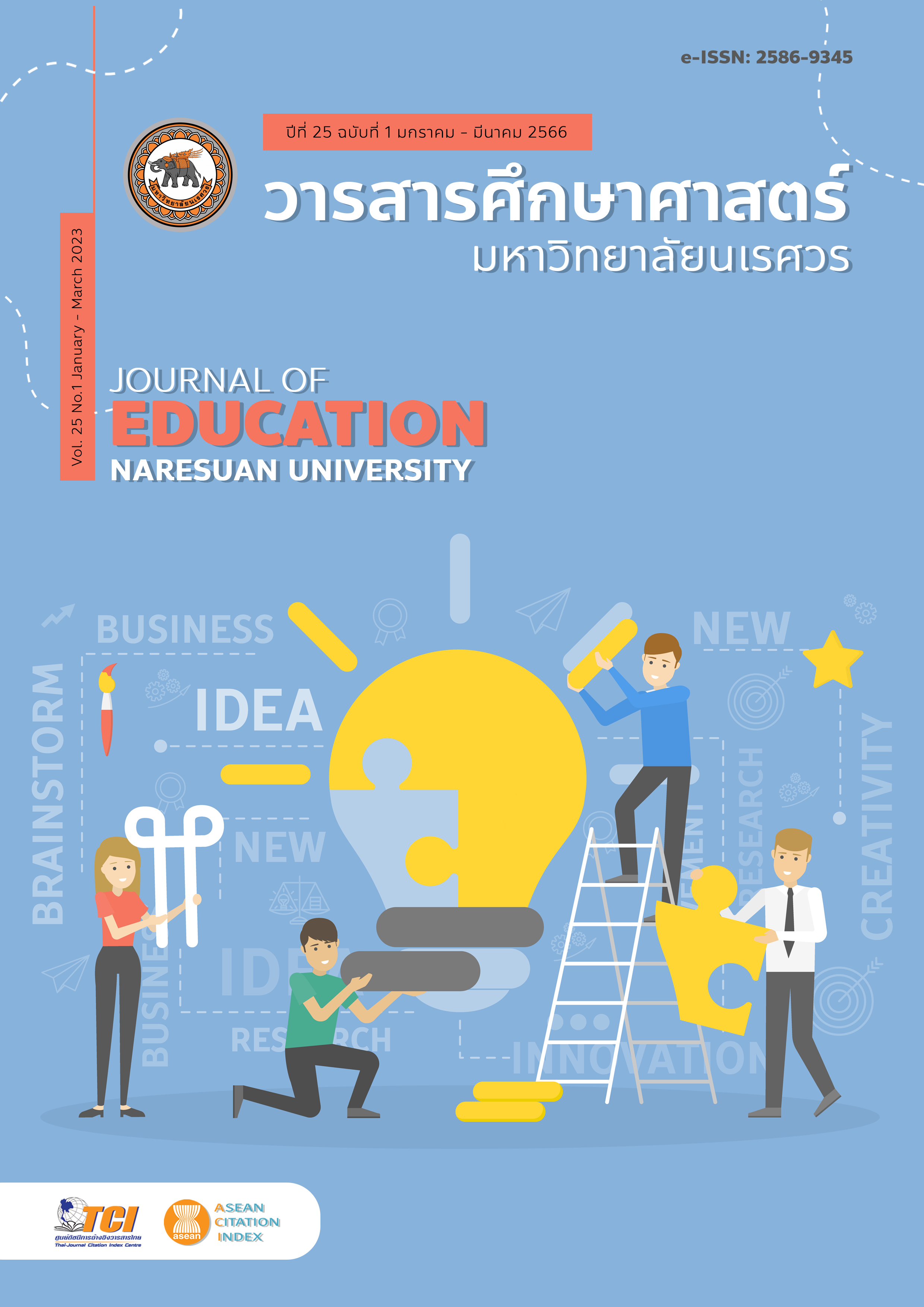AN INSTRUCTIONAL MODEL DEVELOPMENT BASED ON SOCIAL CONSTRUCTIVISM AND AUTHENTIC LEARNING APPROACHES TO ENHANCE DIFFERENTIATED INSTRUCTION ABILITY FOR STUDENT TEACHERS การพัฒนารูปแบบการจัดการเรียนรู้ตามแนวทฤษฎีการสร้างความรู้ด้วยการปฏิสัมพันธ์ทางสังคมร่วมกับแนวคิดการเรียนรู้ตามสภาพจริง เพื่อส่งเสริมความสามารถในการจัดการเรียนรู้ที่เน้นความแตกต่างระหว่างบุคคลสำหรับนักศึกษาครู
Main Article Content
Abstract
The purposes of this research were to 1) study approaches to develop an instructional model, 2) develop and assess the quality of an instructional model, and 3) study the results of using an instructional model by (1) comparing students’ differentiated instruction ability after instructional model implementation with 70% criterion, and (2) studying the differentiated instruction ability for student teachers during an instructional model implementation. The samples consisted of 27 students of the Bachelor of Education Program, Faculty of Education, Uttaradit Rajabhat University selected by purposive sampling techniques. The instruments included 1) an instructional model based on Social Constructivism and Authentic Learning Approaches, 2) a differentiated instruction ability assessment form, and 3) fieldnotes. The data were statistically analyzed by mean, standared deviation, content analysis, and t-test one sample. The results revealed as follows: 1) The learning process emphasized on organization of authentic learning activities in order for learners to construct knowledge through social interaction. The results also revealed that learning should focus on knowledge exchange and sharing in order for student teachers to fulfill and learn from each other. The teachers encouraged and challenged students to learn, and also motivated them to search and collaboratively construct new knowledge. 2) The instructional model consisted of four parts: Part 1, the backgrounds of an instructional model, Part 2, five components of an instructional model including principles, objectives, content, learning activities, and measurement and evaluation, Part 3, application, and Part 4, outcomes on learners. The researchers synthesized learning activities into five steps: Step 1: studying to learn in authentic approaches, Step 2: researching for making solutions, Step 3: constructing knowledge for application, Step 4: exchanging new knowledge, and Step 5: evaluating learning outcomes. The results of instructional model evaluation revealed that the model was generally at a high level of appropriateness ( = 4.15, SD = 0.39), and the result of assess the effectiveness of learning activity was 75.62/76.09 which was higher than the stated criterion. (1) The result of comparing student teachers’ differentiated insrtruction ability with the stated criterion after instructional model implementation found that student teachers’ scores was at 85.45%, which was higher than the criterion with statistical significance at 0.5 level. (2) An observation revealed that student teachers are able carry out differentiated instruction effectively, work collaboratively. Students can organise learning activities using effective group techniques. Questions were used to encourage learning and sharing and fulfilling knowledge to one another. The organised a positive interaction environment which is relaxing for effective learning and can carry out effective assessment and evaluation.
Article Details

This work is licensed under a Creative Commons Attribution-NonCommercial-NoDerivatives 4.0 International License.
The owner of the article does not copy or violate any of its copyright. If any copyright infringement occurs or prosecution, in any case, the Editorial Board is not involved in all the rights to the owner of the article to be performed.
References
ASCD Learn Teach Lead. (2011). What is differentiated instruction and why differentiate? Retrieved from https://pdo.ascd.org/LMSCourses/PD11OC115M/media/DI-Intro_M1_Reading_What_Is_DI.pdf
Corley, M. A. (2015). Differentiated instruction adjusting to the needs of all learners. Washington, D.C.: American institutes for research.
Joyce, B., & Weil, M. (2004). Models of teaching. Boston: Allyn and Bacon.
Kalpana, T. (2014). A constructivist perspective on teaching and learning: A conceptual framework. International Research Journal of Social Sciences, 3, 27-29.
Khemmani, T. (2010). Science of teaching pedagogy. knowledge for effective learning management (12th ed.) Bangkok: Chulalongkorn University Press. [in Thai]
Kulachai, K., et al. (2011). Facebook: The practice of social constructivist in blended learning. Retrieved November 30, 2019, from https://www.slideshare.net/kulachai/facebook-the-practice-of-social-constructivist-in-blended-learning [in Thai]
Lisa, M. S., & Valle, B. E. (2013). Social constructivist teaching strategies in the small group classroom. Small Group Research, 44(4), 395-411.
Lombardi, M. M. (2007). Authentic learning for the 21st century: An overview. EDUCAUSE Learning Initiative, 1, 1-12.
Meechan, S. (2004). Rater Agreement Index: RAI. Songklanalarin Journal of Social Sciences and Humanities, 10(2), 113-125. [in Thai]
Newmann, F. M., Secada, W. G., & Wehlage. G. G. (1995). A guide to authentic instruction and assessment: Vision, standards and scoring. Madison: Wisconsin Center Education Research.
Piyasri, B. (2013). The professional development model to enhance teaching competency of teachers through differentiated instruction (Doctoral Dissertation). Nakhon Pathom: Silpakorn University. [in Thai]
Powell, K. C., & Kalina, C. J. (2009). Cognitive and social constructivism: Developing tools for an effective classroom. Education, 130(2), 241-250.
Prachanban, P. (2009). Research methodology in science. Phitsanulok: Rattanasuwankanphim. [in Thai]
Somaboot, A. (2013). Constructivist theory. Retrieved May 5, 2017, from https://teacherweekly.wordpress.com/2013/09/25/constructivist-theory [in Thai]
Subban, P. (2006). Differentiated instruction: A research basis. International Education Journal, 7(7), 935-947.
Tomlinson, C., & Marcia, B. (2011). Managing a differentiated classroom a practical guide. Scholastic Teaching Resources
Vygotsky, L. S. (1978). Mind in society. Cambridge: Harvard University Press.


